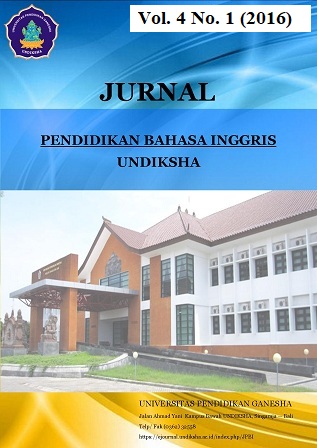Derivational and Inflectional Morphemes in Wongaya Gede Dialect
DOI:
https://doi.org/10.23887/jpbi.v4i1.8081Abstract
Penelitian ini dirancang dalam bentuk penelitian deskriptif kualitatif dengan tujuan untuk mendeskripsikan awalan dan akhiran pada Bahasa Bali khususnya dialek Wongaya Gede yang termasuk morfem derivasi dan infleksi. Terdapat tiga informan dipilih berdasarkan beberapa kriteria. Tiga cara digunakan untuk mengumpulkan data, yaitu melalui observasi, rekaman, dan wawancara (mendengarkan dan mencatat). Hasil dari penelitian ini menunjukkan bahwa ditemukan lima jenis awalan pada dialek Wongaya Gede, yaitu awalan {mә-}, {kә-}, {N-}, {si-}, dan {ә-} dan enam jenis akhiran: {-әng}, {-an}, {-in}, {-ne}, {-ә }, dan {-n}. Ada empat jenis awalan: {mә}, {kә-}, {N-}, dan {si-}, dan satu jenis akhiran: {-әng} yang termasuk morfem derivasi. Tiga jenis awalan: {N-}, {ә-}, dan {mә-} dan lima jenis akhiran: {-an}, {in}, {-ne}, {-ә}, and {-n} termasuk morfem infleksi.Kata Kunci : morfem derivasi, morfem infleksi, awalan, akhiran
This study was designed in form of descriptive qualitative study with the aim of describing the prefixes and suffixes in Wongaya Gede dialect which belong to derivational and inflectional morphemes. Three were three informants chosen based on a set of criteria. Three techniques were used to collect the data, namely observation, recording, and interview technique (listening and noting). The results of the study indicare that there are five kinds of prefixes found in Wongaya Gede dialect, namely {mә-}, {kә-}, {N-}, {si-}, and {ә-} and six kinds of suffixes: {-әng}, {-an}, {-in}, {-ne}, {-ә}, and {-n}. There are four kinds of prefixes: {mә}, {kә-}, {N-}, and {si-}, and one kind of suffixes: {-әng} which belong to derivational morphemes. In addition, three kinds of prefixes: {N-}, {ә-}, and {mә-} and five kinds of suffixes: {-an}, {in}, {-ne}, {-ә}, and {-n} belong to inflectional morphemes.
keyword : derivational morphemes, inflectional morphemes, prefixes, suffixes
Published
2016-07-29
Issue
Section
Articles
License
Authors who publish with the Jurnal Pendidikan Bahasa Inggris Undiksha agree to the following terms:- Authors retain copyright and grant the journal the right of first publication with the work simultaneously licensed under a Creative Commons Attribution License (CC BY-SA 4.0) that allows others to share the work with an acknowledgment of the work's authorship and initial publication in this journal
- Authors are able to enter into separate, additional contractual arrangements for the non-exclusive distribution of the journal's published version of the work (e.g., post it to an institutional repository or publish it in a book), with an acknowledgment of its initial publication in this journal.
- Authors are permitted and encouraged to post their work online (e.g., in institutional repositories or on their website) prior to and during the submission process, as it can lead to productive exchanges, as well as earlier and greater citation of published work. (See The Effect of Open Access)













